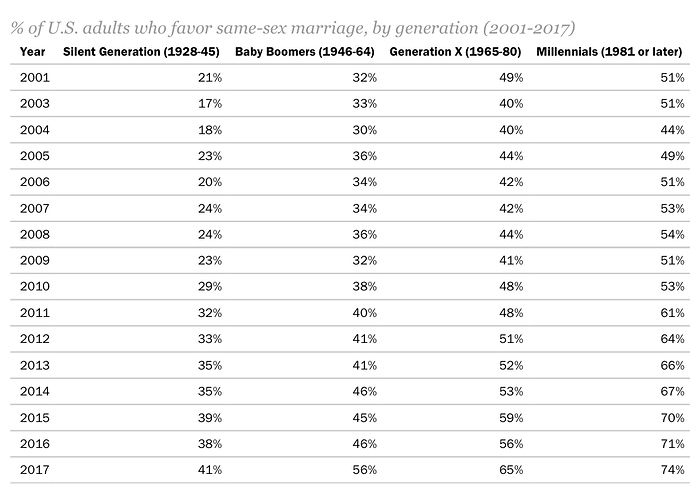Yet another cute graphic. As I said before - I agree with Scalzi. I agree (with one unimportant quibble) with the cartoon about the “self made man”. I agree with the graphic you just posted. In fact that graphic is a great visual representation of my “Play by the rules and Play fair. They are not the same.” Play by the rules means don’t cut the fence down or go steal someone else’s box. Play fair means
We are in complete agreement that inequality based on previous active racism is a big huge deal. We’ve been in this agreement since you started the thread.
We have identified a problem! Which leads to two further questions in my mind. Where does it rank in terms of other problems we also face? How do we solve it?
Your story was that you had an epiphany when one lady told you her opinion. I’ve had a different response. Unlike you by 2012 or 2013 I was a convert to the idea that the older version of colorblindness being the solution to racism was not enough. Maybe I’d seen the graphic you just posted. Almost certainly I’d read Scalzi’s essay. It doesn’t matter what the source I was a convert.
But in 2014 and basically every year since then I’ve been privy to a fairly unfiltered gripe session about what is wrong with the world by 200+ minority 18 year olds. They have no consensus that this built in over time racism is a big deal. Some do. Some think its a small thing that is less important then other problems. Others think it isn’t an issue to at.
My epiphany was that just because I passionate believed something was a serious problem it was not my place to force anyone else to view it as the biggest problem. Solving the problem of institutionalized racism is a big, worth, and important goal. But it isn’t everyone’s goal and assuming that we know best is also a form of bigotry.
Final we come to how are we going to solve the issue. So far your idea seems to be make online forums echo chambers. There is value it in.
Reading from both directly stated and implied statements in many of the threads we see some people are going with the idea of pointing out the issue. I tend to also lump this group in with the people who are pointing out the more immediate racist political issue. I’m mixing two points and that might be where I’m losing you but I mix them because both of them are fundamentally attempting to change the minds of people from a misconception (institutionalized racism and hidden racism found in nationalism are OK or at least minor) to a hopefully better conception (institutionalized racism is a big deal, there is a form of racism even in some actions that seem motivated by things other than race).
Interestingly enough since I am professionally involved in changing conceptions I am interested in changing conceptions. But that involves a lot of discussion because just pointing out the issue or, even worse, yelling about the issue is only going to change the conceptions in a few people (if you want to talk about real change not just repeating s rote phrase). It’s going to take being willing to talk about what motivates some of the people who hold differing opinions. It’s going to take figuring out ways to engage them without making them instantly close their mind,
At one point years ago I was naive and though we could wait them out but the most negative result of listening to my students is that Dr. Haidt (interesting that you posted a Medium article that mentioned him - I linked to his work earlier in the thread) seems to be right and a conservative mindset might just be something that is a constant in some portion of humankind throughout different cultures. It’s not just old white guys so letting people die off isn’t going to swing the needle far enough.
Looking at politics I’d say we have very roughly 50% of the US that is very likely not to agree with you and I on institutionalized, built up over time racism and the need for fairness not just equality. Do you have any ideas to solve it or do you just want to keep posting things I’ve seen before?
